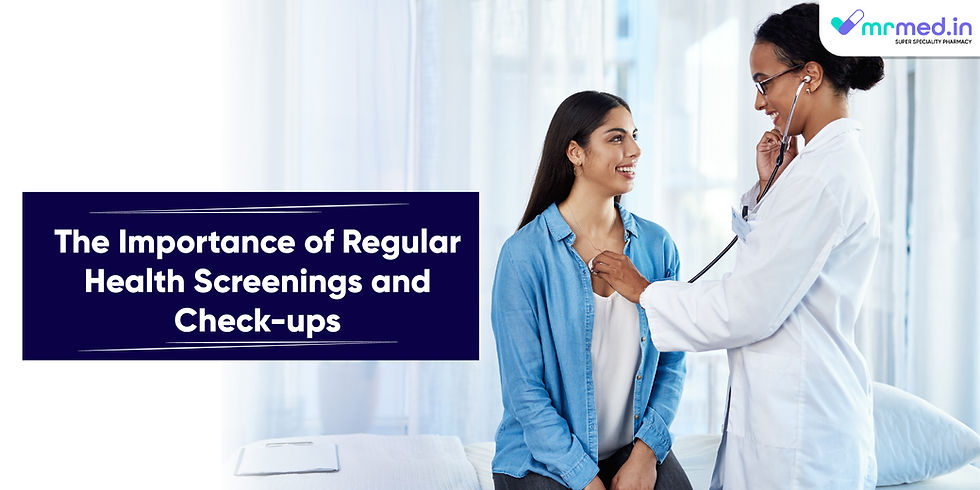The Importance of Regular Health Screenings and Check-ups
- devendrasingh1
- Aug 13, 2024
- 3 min read

In today’s fast-paced world, it’s easy to overlook the importance of regular check-ups and health screenings. However, these routine visits to your healthcare provider are crucial for maintaining optimal health and preventing diseases. Regular health screenings can detect potential health issues early, making them easier to treat and manage.
What is the purpose of regular check-ups?
Regular check-ups are comprehensive evaluations performed by healthcare professionals to assess an individual's overall health. These evaluations typically include a physical examination, a review of medical history, and various tests tailored to the patient's age, sex, and health status. Regular check-ups are essential for several reasons:
Early Detection of Diseases: Many diseases, such as hypertension, diabetes, and cancer, can develop without noticeable symptoms. Regular check-ups help in early detection, increasing the chances of successful treatment.
Preventive Care: Routine visits allow healthcare providers to recommend preventive measures, such as vaccinations, lifestyle modifications, and screenings, to avert potential health issues.
Monitoring Existing Conditions: For individuals with chronic conditions, regular check-ups are vital for monitoring the condition and adjusting treatment plans as necessary.
Building a Health Profile: Over time, regular visits create a comprehensive health profile, enabling healthcare providers to make informed decisions and provide personalised care.
What are the most important health screenings?
Health screenings are specific tests and procedures aimed at identifying health problems before symptoms appear. Some of the essential screenings include:
Blood Pressure Checks: Regular blood pressure checks are crucial for detecting hypertension, a major risk factor for heart disease and stroke. Elevated blood pressure often shows no symptoms, making regular monitoring vital.
Cholesterol Tests: High cholesterol levels can lead to atherosclerosis, increasing the risk of heart attack and stroke. Regular cholesterol screenings help in managing lipid levels through lifestyle changes or medication.
Blood Sugar Tests: These tests are essential for detecting prediabetes and diabetes. Early diagnosis and management of blood sugar levels can prevent complications such as nerve damage, kidney disease, and cardiovascular issues.
Cancer Screenings: Various screenings, such as mammograms, Pap smears, colonoscopies, and prostate exams, are designed to detect cancers at an early, more treatable stage.
Bone Density Tests: These tests, especially important for postmenopausal women and older adults, help diagnose osteoporosis and prevent fractures.
What is the accessibility of medicines online?
The advent of online medicine has revolutionised healthcare, making it more accessible and convenient. Patients can now consult with healthcare providers, order medications, and receive medical advice from the comfort of their homes. This increased accessibility encourages more individuals to keep up with their health screenings and regular check-ups.
Online medicine platforms offer several benefits:
Convenience: Patients can schedule appointments and consultations at their convenience, reducing the need for travel and waiting times.
Accessibility: Individuals in remote areas or those with mobility issues can access healthcare services more easily.
Continuity of Care: Online platforms allow for continuous monitoring and follow-up, ensuring patients adhere to their health management plans.
Why are regular blood pressure checks important?
A regular blood pressure check is a simple yet vital health screening that can significantly impact your health. High blood pressure, or hypertension, is often called the "silent killer" because it typically has no symptoms but can lead to severe health problems if left untreated.
Regular monitoring of blood pressure can:
Prevent Heart Disease: By detecting and managing high blood pressure, the risk of heart attacks and strokes can be significantly reduced.
Identify Underlying Conditions: High blood pressure can be a sign of other health issues, such as kidney disease or hormonal disorders.
Guide Treatment Plans: Regular checks help healthcare providers tailor treatment plans and make necessary adjustments to medications or lifestyle recommendations.
Telma LNC Tablet is commonly prescribed for managing high blood pressure. The tablet combines telmisartan, a medication that helps relax blood vessels and lower blood pressure, with other components that support overall cardiovascular health.
What are the benefits of screening tests?
Regular health screenings offer numerous benefits that contribute to overall well-being and longevity. These benefits include:
Early Detection: Identifying health issues early increases the likelihood of successful treatment and reduces the risk of complications.
Prevention: Screenings can detect risk factors for diseases, allowing for preventive measures to be implemented.
Improved Health Outcomes: Early intervention and continuous monitoring lead to better management of chronic conditions and improved health outcomes overall.
Peace of Mind: Regular check-ups provide reassurance and peace of mind, knowing that your health is being monitored and managed proactively.
Regular health screenings and check-ups are fundamental to maintaining good health and preventing serious medical conditions. Prioritise regular blood pressure checks and other essential screenings to ensure early detection and effective management of potential health issues. By doing so, you take a significant step towards a healthier, longer life.



Comments